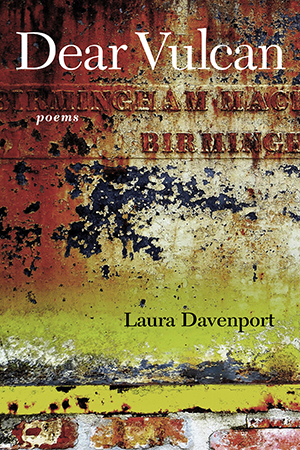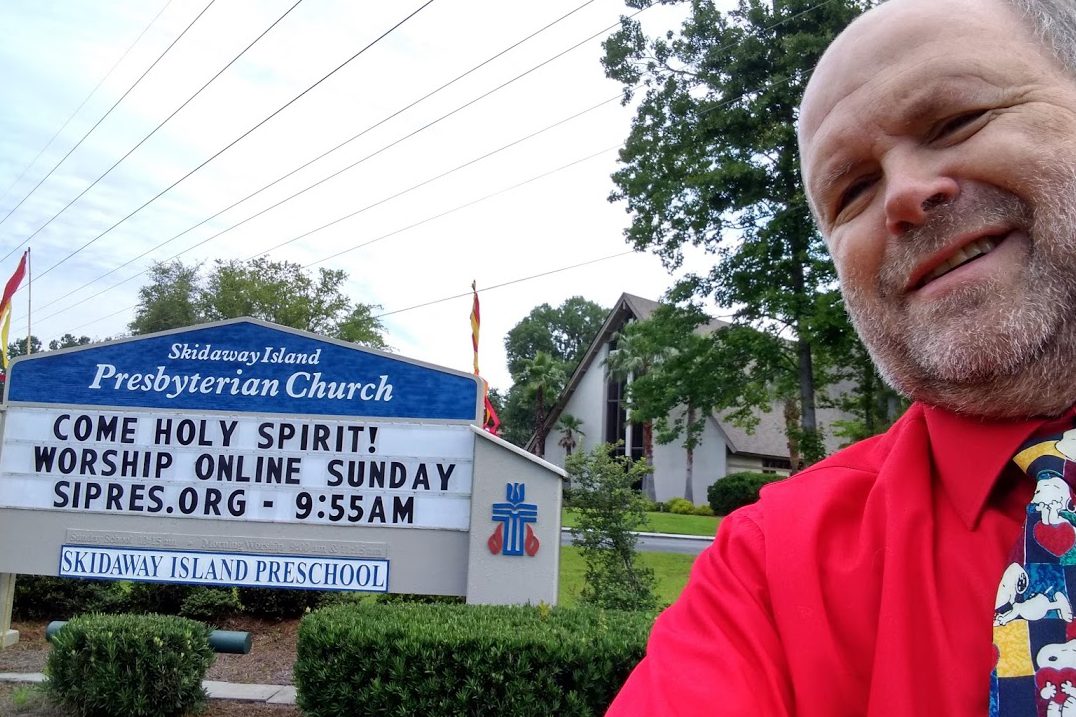

Jeff Garrison
Skidaway Island Presbyterian Church
Acts 2:1-14
Pentecost, May 31, 2020
2020 is turning out to be a year we’ll not forget. Everything seems out of control. A virus has killed over 100,000 Americans topped off by an economy in a free-fall. We’ve witnessed the murders of innocent and unarmed black men in Brunswick and in Minneapolis, and the resulting riots threatening to unravel our nation. It’s scary. But the world has often been a scary place. For Christians, the world of the first century was scary. Jesus was essentially lynched and many more would also die a martyr’s death.[1] But out of that death came the church.
Something happened on this day nearly 2000 years ago. God’s Spirit poured down on the few believers and they began a movement. As I read this passage, think about what God did in Jerusalem, and what God might be doing in the world today. Read Acts 2:1-14.
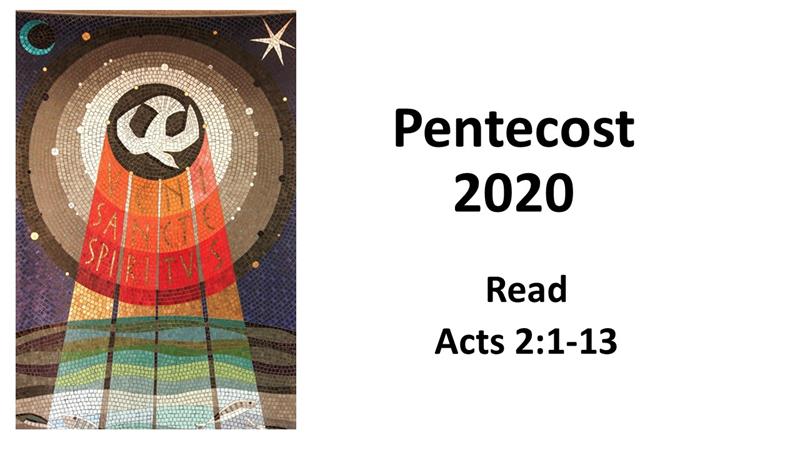
 There was an elderly woman who came home from a Bible study one evening and discovered a burglar in her home. In the darken house, she yelled at the intruder, “Stop, Acts 2:38.” The thief turned and she yelled again, “Stop, Acts 2:38.” He froze. He raised his hands as she calmly called the police. After the officer had handcuffed the man, he asked why he’d surrendered to a woman shouting out a Bible verse. “A Bible verse? I thought she had an axe and two 38s”.
There was an elderly woman who came home from a Bible study one evening and discovered a burglar in her home. In the darken house, she yelled at the intruder, “Stop, Acts 2:38.” The thief turned and she yelled again, “Stop, Acts 2:38.” He froze. He raised his hands as she calmly called the police. After the officer had handcuffed the man, he asked why he’d surrendered to a woman shouting out a Bible verse. “A Bible verse? I thought she had an axe and two 38s”.
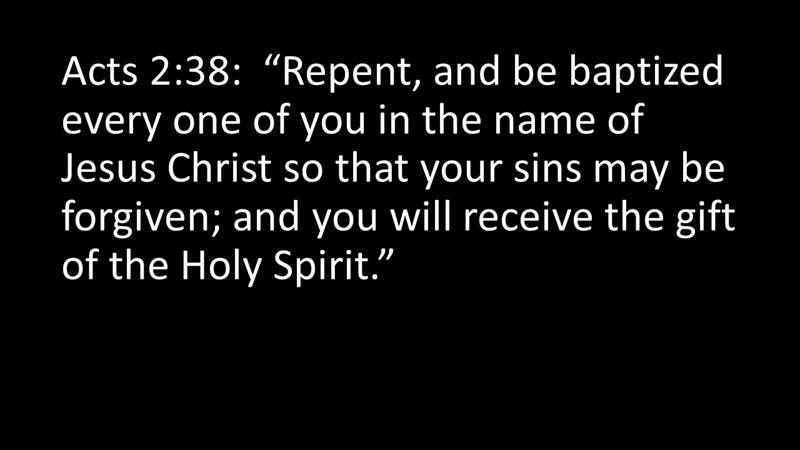 Peter, after his great sermon, that follows the account we’ve just read, called on those within his hearing to “Repent, be baptized, every one of you in the name of Jesus Christ so that your sins may be forgiven and you will receive the power of the Holy Spirit.” Acts 2:38.
Peter, after his great sermon, that follows the account we’ve just read, called on those within his hearing to “Repent, be baptized, every one of you in the name of Jesus Christ so that your sins may be forgiven and you will receive the power of the Holy Spirit.” Acts 2:38.
T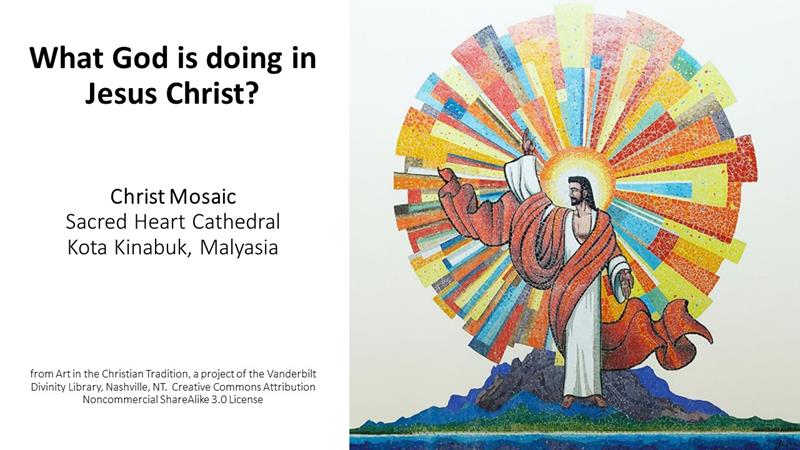 oo often, we think we need force to back up our words, or as in the joke, the possibility of force. But Scripture constantly reminds us our hope is not in what we do or what we have, but in what God has done and is doing in Jesus Christ. We see this with Pentecost, when those flames of the Spirit poured out on a motley group. God takes the initiative. Without God, our efforts are in vain.
oo often, we think we need force to back up our words, or as in the joke, the possibility of force. But Scripture constantly reminds us our hope is not in what we do or what we have, but in what God has done and is doing in Jesus Christ. We see this with Pentecost, when those flames of the Spirit poured out on a motley group. God takes the initiative. Without God, our efforts are in vain.
As dawn broke on this day in which the church came into being, there were only 120 or so believers. From this small beginning, the Christian faith now claims approximately 1/3 of the world’s population. These “tongues of flames” fell upon the timid group of believers. Filled with God’s Spirit, they set the world on fire. When the morning began, they were like a car with no gas. They had a purpose, but no energy. So, they waited, knowing Jesus promised his Spirit.
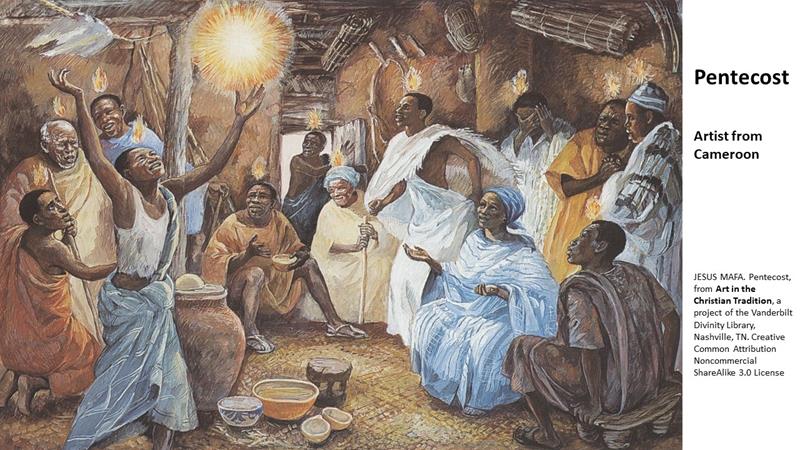 These men and women are not the type of people you’d think could change the world. They’re marginalized. And, to be honest, they don’t change the world. That’s part of the point of the story. God’s the primary actor. Without God’s intervention, nothing would have happened. And the same is true in our lives. God can use us; we don’t have to be sophisticated or multi-talented. The disciples were not great leaders or thinkers, government officials or military heroes. What God needs are people who are faithful. These believers displayed their faithfulness. Many of them were faithful even unto death. With God, all things are possible.
These men and women are not the type of people you’d think could change the world. They’re marginalized. And, to be honest, they don’t change the world. That’s part of the point of the story. God’s the primary actor. Without God’s intervention, nothing would have happened. And the same is true in our lives. God can use us; we don’t have to be sophisticated or multi-talented. The disciples were not great leaders or thinkers, government officials or military heroes. What God needs are people who are faithful. These believers displayed their faithfulness. Many of them were faithful even unto death. With God, all things are possible.
The second aspect of Pentecost for us to consider is the linkage between the Old and New Covenant. Those who’d gathered on this morning, on the day of Pentecost, gathered to celebrate a Jewish holiday. The name Pentecost is derived from the festival held on the fiftieth day following Passover. The festival was also known as the Feast of the Weeks, the Feast of the Harvest, or the Day of the First Fruits. Originally it was when the grain harvest was formally dedicated, but over time the festival came to represent the giving of the law on Sinai, which, according to tradition, occurred fifty days after the Exodus from Egypt.
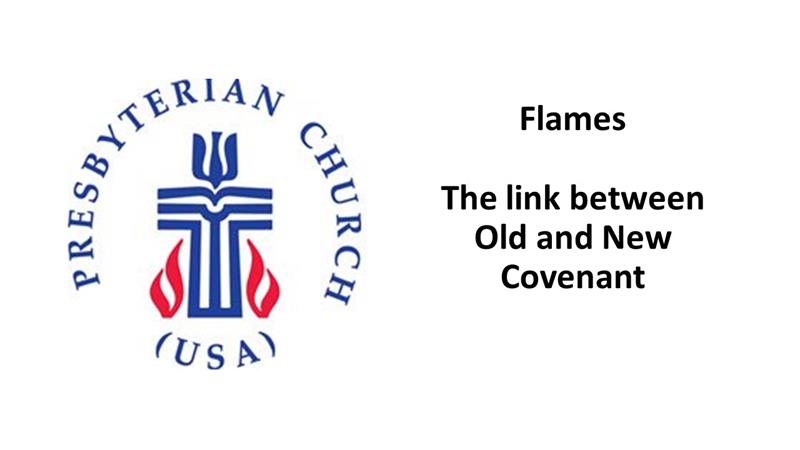
The two flames on our Presbyterian cross represent the two covenants—the Old and the New. The same is true for the two candles on our communion table. The flame of the Old Testament is the giving of the law on Sinai. The other flame represents the coming of the Holy Spirit on Pentecost when the Old Testament prophecy was fulfilled. God wrote the law onto the hearts of believers.[2]
To have the fullness of God’s word, to know God to the best of our limited human abilities, we must draw upon all of Scripture. The two covenants remind us of the mysterious nature of our God. What we know about God has been revealed to us by the Almighty, first in the Hebrew Scriptures and then, the final revelation, in the life of Jesus Christ. Again, God is the actor; God is the one engaging the world.
 The final aspect of Pentecost for us to consider is how this event serves as a model for God’s intention for the world. Consider the group who’d gathered on this morning. They were all Palestinian Jews. First century Judaism was more multi-cultural than they were. They gather, a homogeneous lot, without an idea as to what will happen. Soon a violent wind destroys the morning calm. Luke describes the coming of the Spirit as a gale blowing into the house. Picture the curtains blowing, as they used to do in the days before air conditioning when a storm was rising. It was frightening. “What’s happening,” they wonder? Luke goes on to say that the wind was like tongues of fire; like a wildfire that gains momentum consuming all that’s around. And those who had gathered begin to speak, in all different kinds of languages.
The final aspect of Pentecost for us to consider is how this event serves as a model for God’s intention for the world. Consider the group who’d gathered on this morning. They were all Palestinian Jews. First century Judaism was more multi-cultural than they were. They gather, a homogeneous lot, without an idea as to what will happen. Soon a violent wind destroys the morning calm. Luke describes the coming of the Spirit as a gale blowing into the house. Picture the curtains blowing, as they used to do in the days before air conditioning when a storm was rising. It was frightening. “What’s happening,” they wonder? Luke goes on to say that the wind was like tongues of fire; like a wildfire that gains momentum consuming all that’s around. And those who had gathered begin to speak, in all different kinds of languages.
In addition to celebrating the giving of the law, the Pentecost holiday was special for another reason. Passover was considered the “high holy day” for the first century Jewish faithful. But because it was such a long trip, many would stay through Pentecost and would have caught wind of what’s happening at this time.[3] We need to remember that by the first century, Jewish settlements had been established throughout the known world. This explains why there were so many different people in Jerusalem for this festival. They’d come to worship; they’d come with expectation. And here, as they’ve gathered in their ancestral homeland, people who were no longer fluent in Hebrew, begin to hear the gospel in their native languages.
Again, God is the one who is acting. The early disciples and believers who’d gathered weren’t sitting around scheming, trying to create a strategic plan of how the church would grow. And if they had been, you can bet they wouldn’t have even considered reaching such a diverse group of people as they did that day. After all, these people had a tradition of interacting only with those who looked and sounded and acted like they did. God is doing the work here. God’s vision is much larger than they could imagine. God is calling all people to hear the good news of Jesus Christ.
 Friends, we live in an uncertain time. We must place our faith in God as revealed in Jesus Christ, and live humbly and compassionately, showing the world a different way to live with one another. Violence isn’t the answer. Love is. God loves this world and calls on his church to love the world. When we marginalize others, when we turn our heads at injustice, we fail to live up to our calling.
Friends, we live in an uncertain time. We must place our faith in God as revealed in Jesus Christ, and live humbly and compassionately, showing the world a different way to live with one another. Violence isn’t the answer. Love is. God loves this world and calls on his church to love the world. When we marginalize others, when we turn our heads at injustice, we fail to live up to our calling.
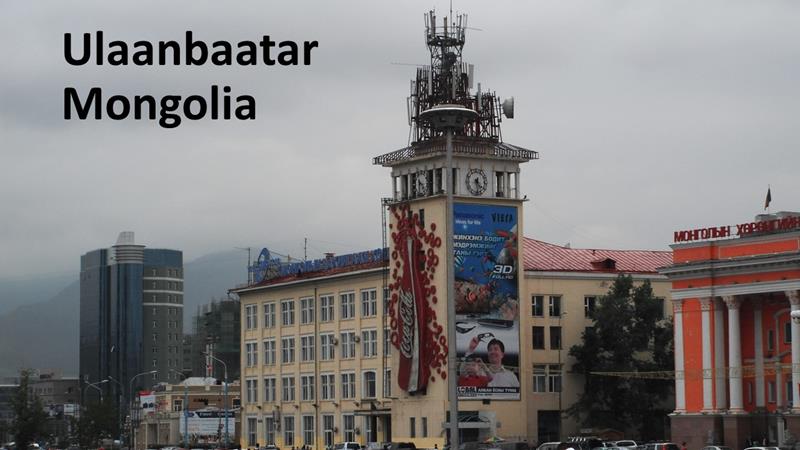 Let me tell you a story. I was in Ulaanbaatar, the capital of Mongolia and was walking with other tourists in the business section of the city. Across a four-lane road, coming toward us, was a man and woman. They were arguing. Then the man pulled back and hit the woman with his fist to her head, knocking her down. In shock, we looked at each other. Others had seen it, too, but no one except us-a group of English-speaking tourist-seemed fazed. We were outraged, yet never felt so helpless. If it had been an English-speaking country, we’d all been on the phone with the police. But here, few knew English and we couldn’t speak Mongolian. We needed those tongues of fire!
Let me tell you a story. I was in Ulaanbaatar, the capital of Mongolia and was walking with other tourists in the business section of the city. Across a four-lane road, coming toward us, was a man and woman. They were arguing. Then the man pulled back and hit the woman with his fist to her head, knocking her down. In shock, we looked at each other. Others had seen it, too, but no one except us-a group of English-speaking tourist-seemed fazed. We were outraged, yet never felt so helpless. If it had been an English-speaking country, we’d all been on the phone with the police. But here, few knew English and we couldn’t speak Mongolian. We needed those tongues of fire!
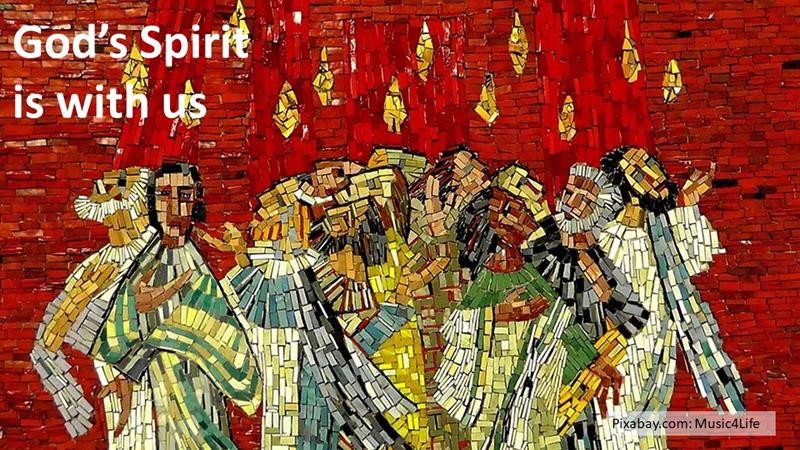 Pentecost shows us that not only does God show up, God gives us the tools needed to do the work for which we’re called. That motley group of disciples are able to preach in the languages of those gathered in Jerusalem. Today, we no longer have to wait for God to show up. God’s Spirit’s with us. Unlike Mongolia, in our country, in our neighborhood, most people understand us. We have no excuse. We must be compassionate toward those suffering from COVID-19. We should grieve the deaths of over 100,000 of our citizens, we need to do our part to keep the virus from spreading further, and we need to speak out against racial injustice. At Pentecost, God gave us a vision of the nations and people being brought together. It’s now our turn. We must help make the vision a reality. Amen.
Pentecost shows us that not only does God show up, God gives us the tools needed to do the work for which we’re called. That motley group of disciples are able to preach in the languages of those gathered in Jerusalem. Today, we no longer have to wait for God to show up. God’s Spirit’s with us. Unlike Mongolia, in our country, in our neighborhood, most people understand us. We have no excuse. We must be compassionate toward those suffering from COVID-19. We should grieve the deaths of over 100,000 of our citizens, we need to do our part to keep the virus from spreading further, and we need to speak out against racial injustice. At Pentecost, God gave us a vision of the nations and people being brought together. It’s now our turn. We must help make the vision a reality. Amen.
©2020
[1] For a link between the cross and lynching, see James H. Cone, The Cross and the Lynching Tree (Orbis Books, 2011).
[2] Jeremiah 31:33.
[3] Beverly Roberts Gaventa, Acts (Nashville: Abingdon, 2003), 74-75

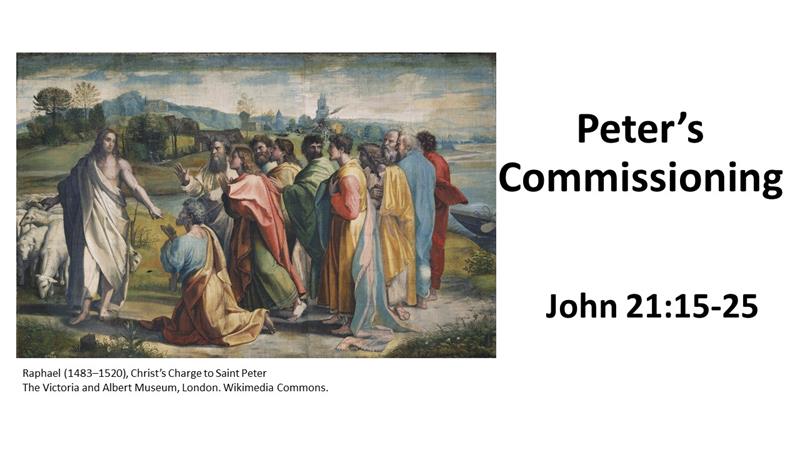
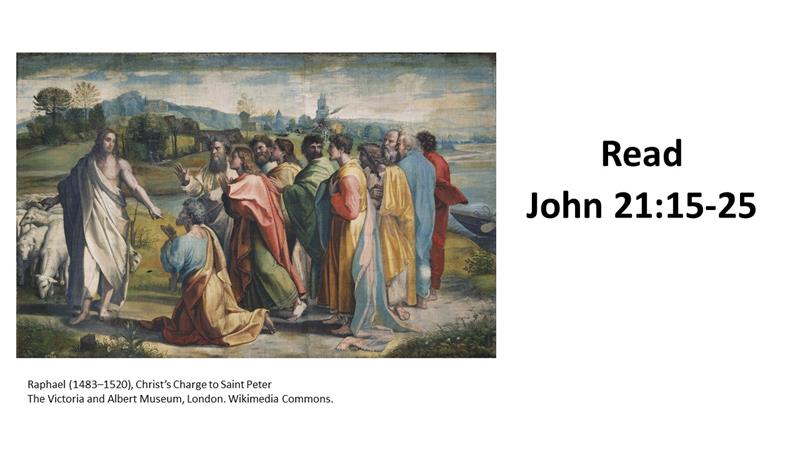
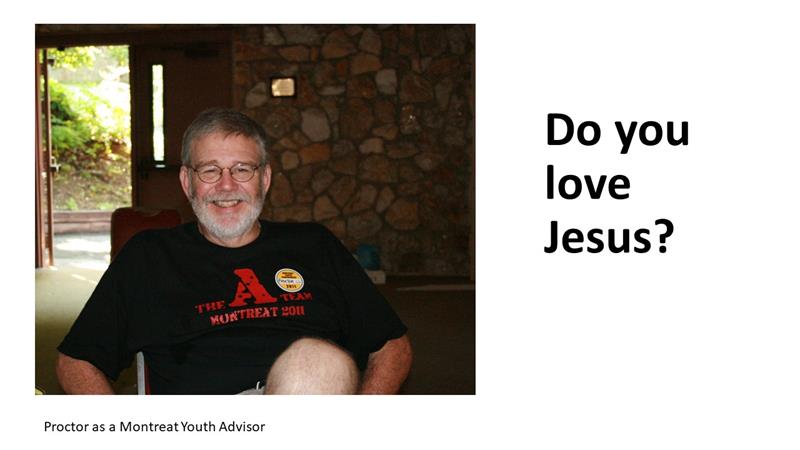 Some of you may know the Reverend Proctor Chambless. He’s a retired minister member of the Savannah Presbytery, and has served a number of congregations within our presbytery and across the South. When I came to this presbytery, Proctor was serving an interim position in another presbytery upstate. He wasn’t here. During the first person examined for ordination as a Minister of the Word and Sacrament at Presbytery, someone stood up and said that since Proctor wasn’t present, he was going to ask Proctor’s question. The question: “Do you love Jesus?” The presbytery, as a body, snickered. I realized I wasn’t in on the joke. I asked someone about this and was told that Proctor always asked that question. When Proctor returned, I figured out who he was before I met him. We had another candidate to examine and Proctor stood and asked this question. It’s kind of a fun thing. The rest of us are thinking probing questions to prod the examinee on the fine points of Reformed Theology, as Proctor, with his deep southern drawl, asks the essential question. “Do you love Jesus?” That’s the question Jesus asks Peter three times. And it’s a question we’re all to ask ourselves. Furthermore, as we’re going to see when we delve into this text, there is one way of knowing that we love Jesus. Do we care for others?
Some of you may know the Reverend Proctor Chambless. He’s a retired minister member of the Savannah Presbytery, and has served a number of congregations within our presbytery and across the South. When I came to this presbytery, Proctor was serving an interim position in another presbytery upstate. He wasn’t here. During the first person examined for ordination as a Minister of the Word and Sacrament at Presbytery, someone stood up and said that since Proctor wasn’t present, he was going to ask Proctor’s question. The question: “Do you love Jesus?” The presbytery, as a body, snickered. I realized I wasn’t in on the joke. I asked someone about this and was told that Proctor always asked that question. When Proctor returned, I figured out who he was before I met him. We had another candidate to examine and Proctor stood and asked this question. It’s kind of a fun thing. The rest of us are thinking probing questions to prod the examinee on the fine points of Reformed Theology, as Proctor, with his deep southern drawl, asks the essential question. “Do you love Jesus?” That’s the question Jesus asks Peter three times. And it’s a question we’re all to ask ourselves. Furthermore, as we’re going to see when we delve into this text, there is one way of knowing that we love Jesus. Do we care for others?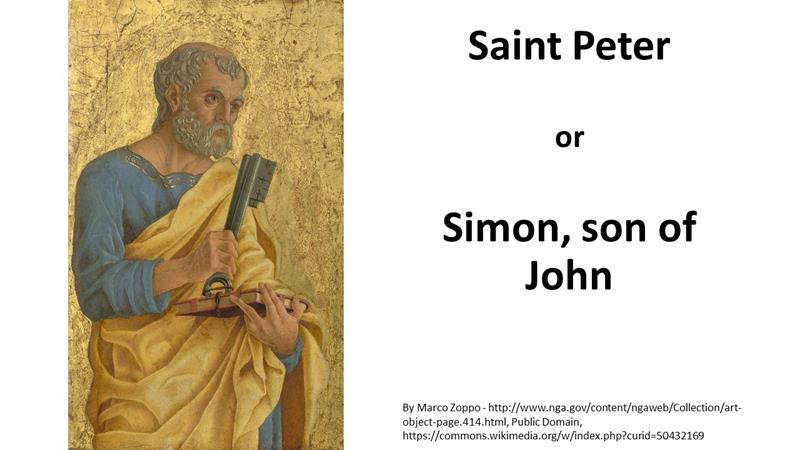 Jesus uses his full legal name. “Simon, son of John.” Did any of you have parents, or maybe a teacher, who when you were in trouble, would use your full name? “Charles Jeffrey!” I would hear that and immediately knew I had done something wrong. Was Peter in trouble? I don’t think so. But Jesus emphasizes the importance of his questioning. When someone uses your full name, it grabs your attention. Jesus asks Peter if he loves him more than these. We can assume Jesus is pointing over toward the other disciples. We’re told that Peter, in two of the gospels, brags at the Last Supper about how much more he loves Jesus than the others, so much so that he’ll never abandon Jesus.
Jesus uses his full legal name. “Simon, son of John.” Did any of you have parents, or maybe a teacher, who when you were in trouble, would use your full name? “Charles Jeffrey!” I would hear that and immediately knew I had done something wrong. Was Peter in trouble? I don’t think so. But Jesus emphasizes the importance of his questioning. When someone uses your full name, it grabs your attention. Jesus asks Peter if he loves him more than these. We can assume Jesus is pointing over toward the other disciples. We’re told that Peter, in two of the gospels, brags at the Last Supper about how much more he loves Jesus than the others, so much so that he’ll never abandon Jesus. Now, after everything that has happened—the betrayal, the crucifixion, the resurrection—Jesus asks if Peter really does love him and, of course, Peter responds positively. “Yes, Lord, you know that I love you.” Jesus then tells Peter to feed his lambs. This questioning goes on for three times, with just slight variations.
Now, after everything that has happened—the betrayal, the crucifixion, the resurrection—Jesus asks if Peter really does love him and, of course, Peter responds positively. “Yes, Lord, you know that I love you.” Jesus then tells Peter to feed his lambs. This questioning goes on for three times, with just slight variations. We’re not given a sense of just how this prediction of Peter’s death was received, but Peter must have pondered it, for he asks about another of the disciples. Jesus tells Peter a great truth. “Don’t worry about him and his death.” It’s almost as if Jesus is saying, “You have enough troubles. Don’t worry about what God seems to give someone else to worry over.” In other words, accept God’s gift as grace and be thankful.
We’re not given a sense of just how this prediction of Peter’s death was received, but Peter must have pondered it, for he asks about another of the disciples. Jesus tells Peter a great truth. “Don’t worry about him and his death.” It’s almost as if Jesus is saying, “You have enough troubles. Don’t worry about what God seems to give someone else to worry over.” In other words, accept God’s gift as grace and be thankful. Here we are, fifty or so generations Peter.
Here we are, fifty or so generations Peter. During these trying times, when we are hiding out in our homes, we might wonder how we can help anyone. There are ways. The Session, at the request of the Mission and Benevolence Committee, has called for a special offering to help care for the homeless in our community. Do what you can to help. The homeless ministries of Savannah are struggling to meet the needs of those who live under the bridges and on the streets.
During these trying times, when we are hiding out in our homes, we might wonder how we can help anyone. There are ways. The Session, at the request of the Mission and Benevolence Committee, has called for a special offering to help care for the homeless in our community. Do what you can to help. The homeless ministries of Savannah are struggling to meet the needs of those who live under the bridges and on the streets.
 Nancy Koester, Harriet Beecher Stowe: A Spiritual Life (Grand Rapids: Eerdmans, 2014), 371 pages, B&W photos, notes.
Nancy Koester, Harriet Beecher Stowe: A Spiritual Life (Grand Rapids: Eerdmans, 2014), 371 pages, B&W photos, notes.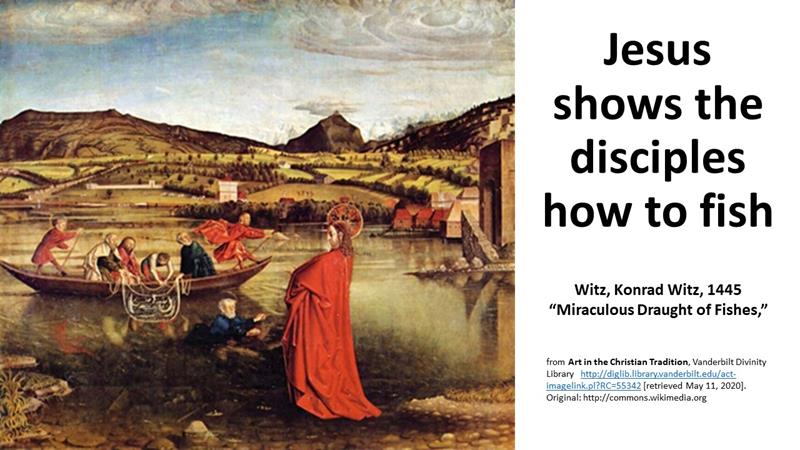 Jeff Garrison
Jeff Garrison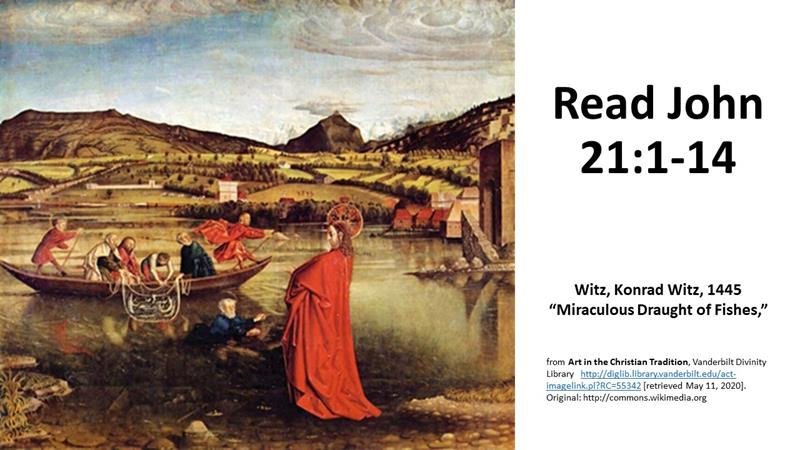
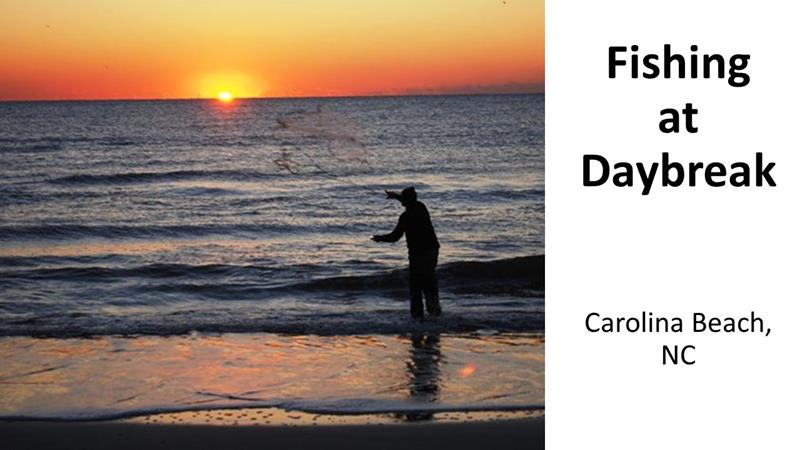 The best fish are fresh from the water. Even greasy bluefish make a great breakfast when grilled over a charcoal fire on the beach. I was probably 10 or 11 when I first had such a treat. We were fishing on Masonboro Island. It was in the fall, when the bluefish run. We got up when it was still pitch dark and chilly. My dad started a charcoal fire, which helped us stay warm. But instead of sitting around the fire, we soon had lines in the dark water, casting out into surf. In darkness, we fished with bait. On the end of the line, we had a rig with a weight and two hooks, each containing a strip of mullet. When the fish hit, we’d yank the rod to set the hook, then reel hard. Soon, if lucky, a flapping fish could be made out from the distant light of the lantern. We’d have to bring the fish into the light in order to safely get out the hook.
The best fish are fresh from the water. Even greasy bluefish make a great breakfast when grilled over a charcoal fire on the beach. I was probably 10 or 11 when I first had such a treat. We were fishing on Masonboro Island. It was in the fall, when the bluefish run. We got up when it was still pitch dark and chilly. My dad started a charcoal fire, which helped us stay warm. But instead of sitting around the fire, we soon had lines in the dark water, casting out into surf. In darkness, we fished with bait. On the end of the line, we had a rig with a weight and two hooks, each containing a strip of mullet. When the fish hit, we’d yank the rod to set the hook, then reel hard. Soon, if lucky, a flapping fish could be made out from the distant light of the lantern. We’d have to bring the fish into the light in order to safely get out the hook. Leaving our fish on sand, we rebait our hooks and again cast out into the surf. Slowly, the sky changes. The stars began to extinguish themselves. A ribbon of light appears on the horizon, and it gradually growed. We began to be able to make out the beach and could see where the waves were breaking. Soon afterwards, the sun would slowly rise, its rays seemingly racing across the water toward me, as if they whose rays were destined just for me.
Leaving our fish on sand, we rebait our hooks and again cast out into the surf. Slowly, the sky changes. The stars began to extinguish themselves. A ribbon of light appears on the horizon, and it gradually growed. We began to be able to make out the beach and could see where the waves were breaking. Soon afterwards, the sun would slowly rise, its rays seemingly racing across the water toward me, as if they whose rays were destined just for me.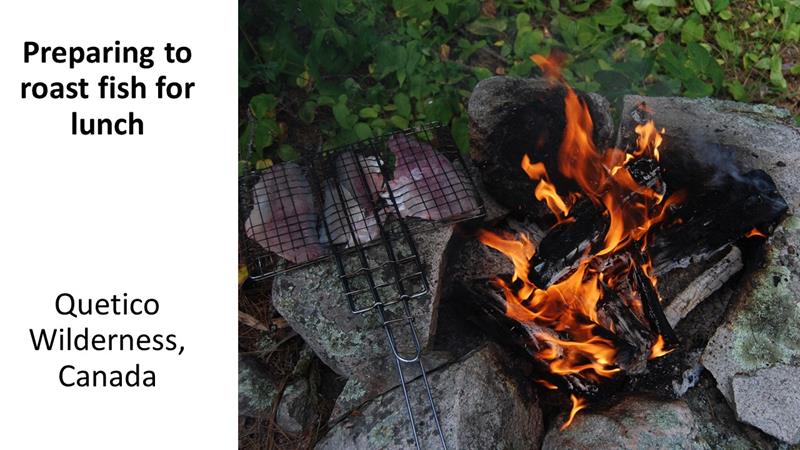 When there was a lull in the action, we’d stop and clean a few fish, washing them off in the surf, and then lay them on a grill over the coals. In a few minutes, we’d be “eatin’ good.” Afterwards, we’d change the rigging on our rods to plugs and spoons and head back to the water’s edge. Good memories of good times.
When there was a lull in the action, we’d stop and clean a few fish, washing them off in the surf, and then lay them on a grill over the coals. In a few minutes, we’d be “eatin’ good.” Afterwards, we’d change the rigging on our rods to plugs and spoons and head back to the water’s edge. Good memories of good times.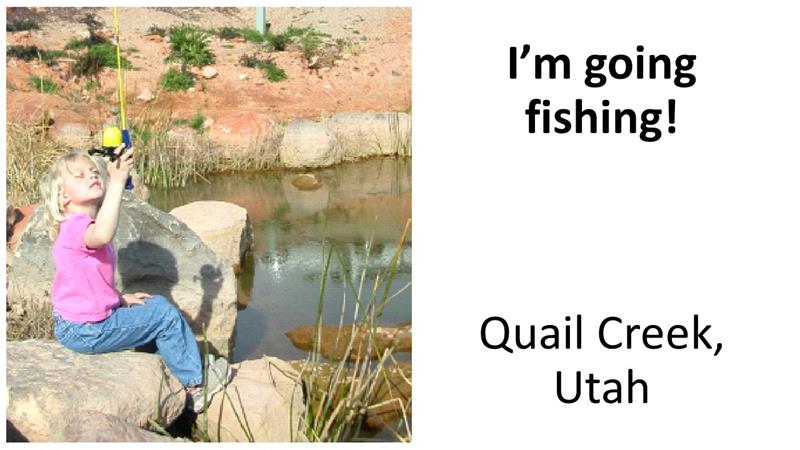 Perhaps it was because I grew up in a home where fishing ranked just below church attendance in priority that Peter’s statement, “I’m going fishing” seems normal. And to the six disciples with him, it sounds like a plan. They head to the water and fished the night. They had terrible luck. That happens. Some mornings there are no bluefish for breakfast.
Perhaps it was because I grew up in a home where fishing ranked just below church attendance in priority that Peter’s statement, “I’m going fishing” seems normal. And to the six disciples with him, it sounds like a plan. They head to the water and fished the night. They had terrible luck. That happens. Some mornings there are no bluefish for breakfast.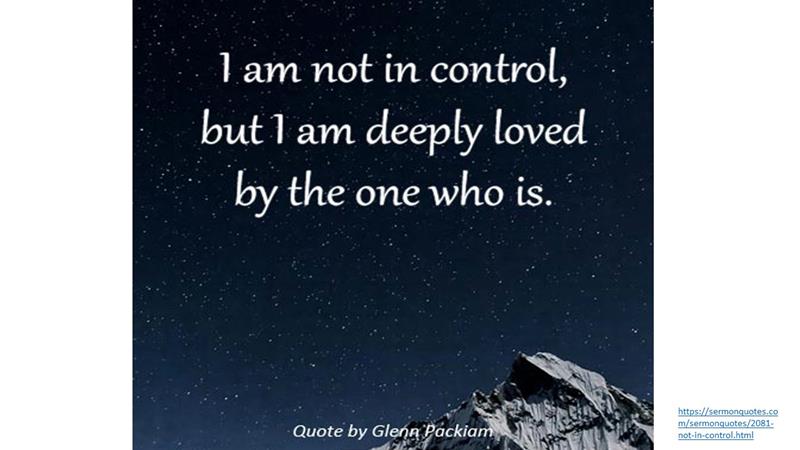 As I’ve emphasized in these sermons on Jesus’ resurrection, the disciples learn a true lesson. They are not in control. Jesus is in control. We often have this image of going to Jesus, but in truth, Jesus first comes to us. In today’s story, Jesus knows where many of his disciples are. They’re by the lakeshore, fishing, because that’s what they know how to do. So, like when he first called them, he returns to call them again. Next week, we’ll look at how Jesus sends out Peter with a mission, but before we go there, I want us to spend some time in this story.
As I’ve emphasized in these sermons on Jesus’ resurrection, the disciples learn a true lesson. They are not in control. Jesus is in control. We often have this image of going to Jesus, but in truth, Jesus first comes to us. In today’s story, Jesus knows where many of his disciples are. They’re by the lakeshore, fishing, because that’s what they know how to do. So, like when he first called them, he returns to call them again. Next week, we’ll look at how Jesus sends out Peter with a mission, but before we go there, I want us to spend some time in this story.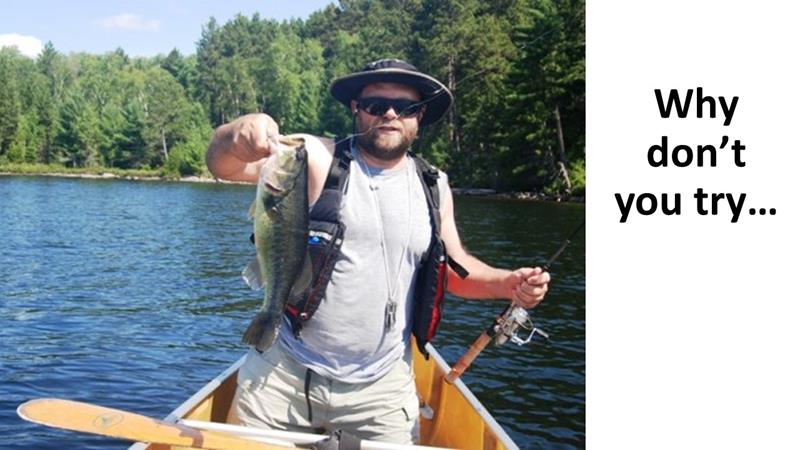 On this night, the fishing hadn’t been good. Jesus then does something else that goes against fishermen etiquette. “Why don’t you fish from the other side?” That’s like suggesting a different lure or fly. “Take off that spinner and put on a jitterbug; or get rid of that wooly bugger and put on a popping bug.” But Jesus’ advice pays off as they catch so many fish the net is about to break. Only then does the Beloved Disciple realizes it’s Jesus. Before he can act, Peter throws on some clothes, jumps in and swims toward shore.
On this night, the fishing hadn’t been good. Jesus then does something else that goes against fishermen etiquette. “Why don’t you fish from the other side?” That’s like suggesting a different lure or fly. “Take off that spinner and put on a jitterbug; or get rid of that wooly bugger and put on a popping bug.” But Jesus’ advice pays off as they catch so many fish the net is about to break. Only then does the Beloved Disciple realizes it’s Jesus. Before he can act, Peter throws on some clothes, jumps in and swims toward shore.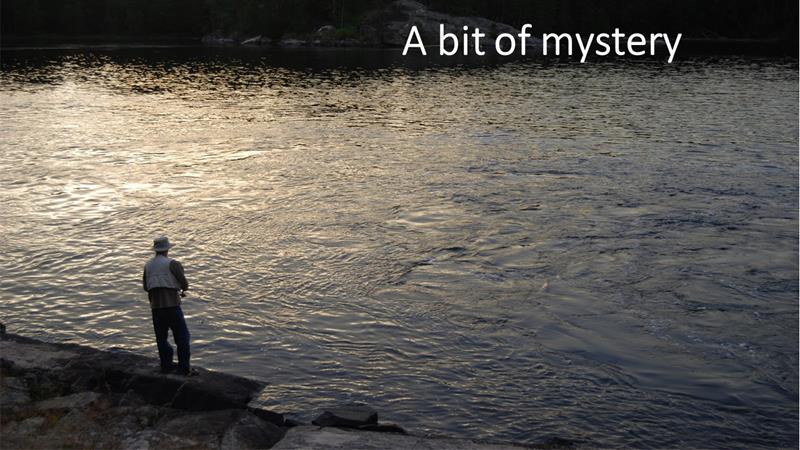 Like the other post-resurrection appearances, there’s also bit of mystery. Why do we even have verse twelve? After Jesus calls them in for breakfast, we’re told that no one dared to ask, “Who are you?” They knew it was Jesus, but the text leaves us wondering what’s going on. Furthermore, they don’t recognize Jesus right off. It’s only when they follow his suggestion that they encounter him. There’s probably a lesson in that, too. When we listen to Jesus and do what he says, our relationship grows.
Like the other post-resurrection appearances, there’s also bit of mystery. Why do we even have verse twelve? After Jesus calls them in for breakfast, we’re told that no one dared to ask, “Who are you?” They knew it was Jesus, but the text leaves us wondering what’s going on. Furthermore, they don’t recognize Jesus right off. It’s only when they follow his suggestion that they encounter him. There’s probably a lesson in that, too. When we listen to Jesus and do what he says, our relationship grows.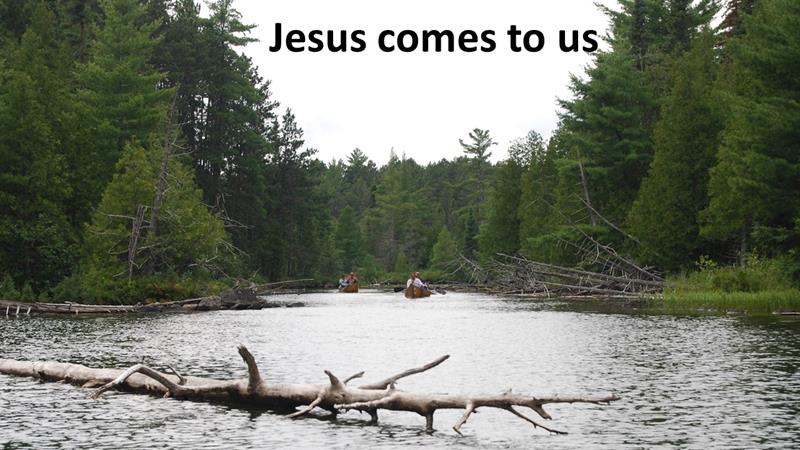 There are three things that happen to the disciples in this passage that we should take to heart. First, Jesus comes to us. Jesus shows up at the most unexpected places. In these stories, he doesn’t show up at church or the synagogue or the temple. Instead, it’s at work, after or before visiting hours. Think about the post-resurrection appearances. Except for meeting the disciples on the road to Emmaus, Jesus always shows up on the shoulders of the day (at daybreak and in the evening). In this case, Jesus arrives as the disciples are finishing up their night shift at a job that wasn’t going to be paying much this day. As followers of Jesus, we must be ready for whenever our Savior decides to pop by. Jesus is not just Lord over Sunday or over religion, he is Lord of all, and can meet us wherever we find ourselves. This is good news in a time that many of us find ourselves prisoners in our own homes! Yes, Jesus can show up even there, you’ll just have to let him in.
There are three things that happen to the disciples in this passage that we should take to heart. First, Jesus comes to us. Jesus shows up at the most unexpected places. In these stories, he doesn’t show up at church or the synagogue or the temple. Instead, it’s at work, after or before visiting hours. Think about the post-resurrection appearances. Except for meeting the disciples on the road to Emmaus, Jesus always shows up on the shoulders of the day (at daybreak and in the evening). In this case, Jesus arrives as the disciples are finishing up their night shift at a job that wasn’t going to be paying much this day. As followers of Jesus, we must be ready for whenever our Savior decides to pop by. Jesus is not just Lord over Sunday or over religion, he is Lord of all, and can meet us wherever we find ourselves. This is good news in a time that many of us find ourselves prisoners in our own homes! Yes, Jesus can show up even there, you’ll just have to let him in.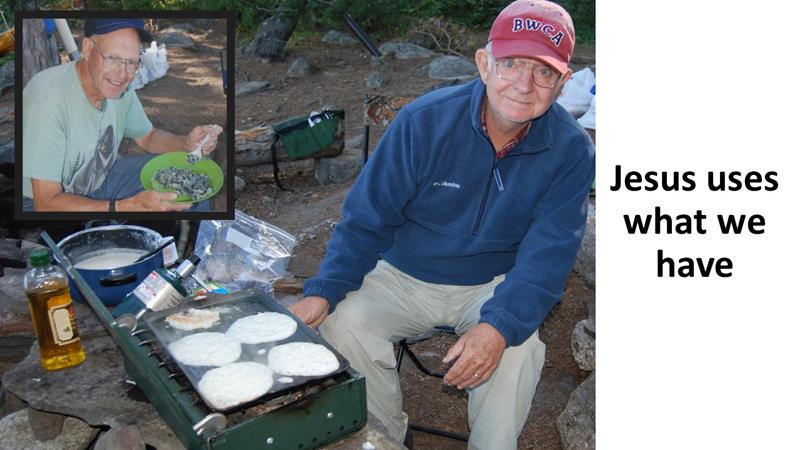 Let me tell you a story to illustrate this. Many of the photos I’ve using today came from a 2008 trip into the Quetico Wilderness in Western Ontario. The guy at the camp stove you see now is Doc Spindler. One morning, he was talking about having pancakes and so proud of himself for prepacking everything he needed. To be helpful, Jim Bruce (who visited us here at SIPC in February and seen in the picture with the full plate) and I went out early that morning, braving the bears as we picked a quart of so of blueberries. We brought them back and Doc was so happy to have blueberries to mix into pancakes. You use what you’re given. Doc knows this. Although a great guy, however, Doc isn’t Jesus. Instead of the baggie with pancake mix, he used a package of meal for frying fish and the blueberry pancakes ended up coming out like goulash. But with a little syrup and butter and an empty stomach, it was still good.
Let me tell you a story to illustrate this. Many of the photos I’ve using today came from a 2008 trip into the Quetico Wilderness in Western Ontario. The guy at the camp stove you see now is Doc Spindler. One morning, he was talking about having pancakes and so proud of himself for prepacking everything he needed. To be helpful, Jim Bruce (who visited us here at SIPC in February and seen in the picture with the full plate) and I went out early that morning, braving the bears as we picked a quart of so of blueberries. We brought them back and Doc was so happy to have blueberries to mix into pancakes. You use what you’re given. Doc knows this. Although a great guy, however, Doc isn’t Jesus. Instead of the baggie with pancake mix, he used a package of meal for frying fish and the blueberry pancakes ended up coming out like goulash. But with a little syrup and butter and an empty stomach, it was still good.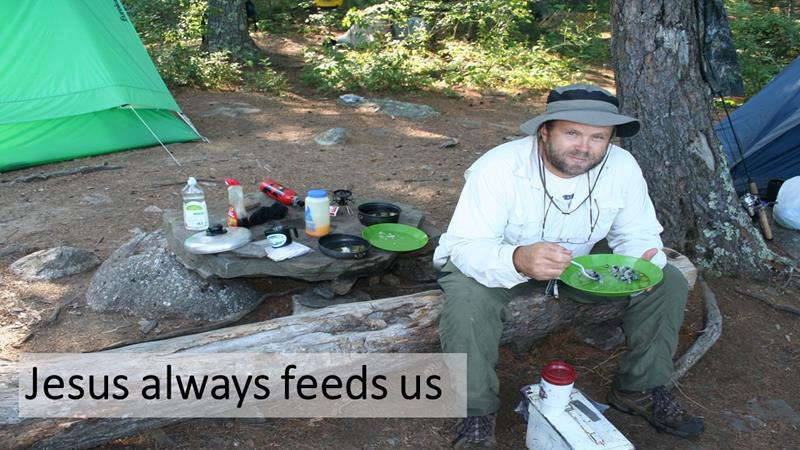 Finally, Jesus feeds us. In this case, he fed the disciples a hearty breakfast of fish and bread. But Jesus, who calls all who are weary to accept his yoke, will restore our tired souls and feed our minds and bodies with his presence and comfort.
Finally, Jesus feeds us. In this case, he fed the disciples a hearty breakfast of fish and bread. But Jesus, who calls all who are weary to accept his yoke, will restore our tired souls and feed our minds and bodies with his presence and comfort.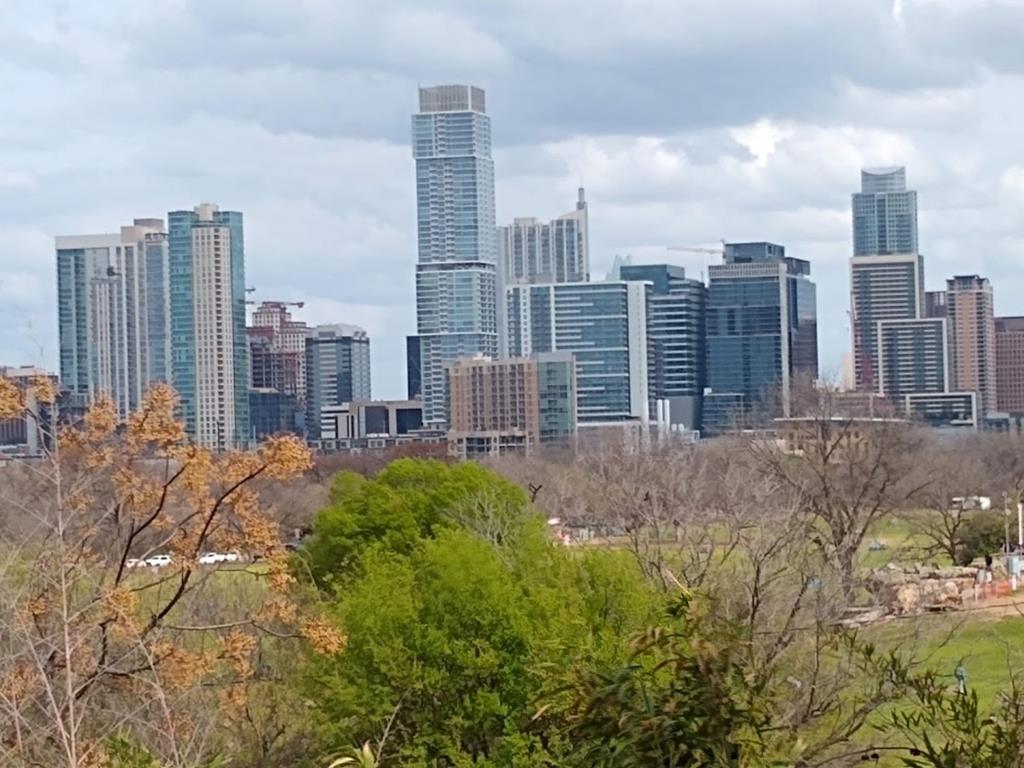
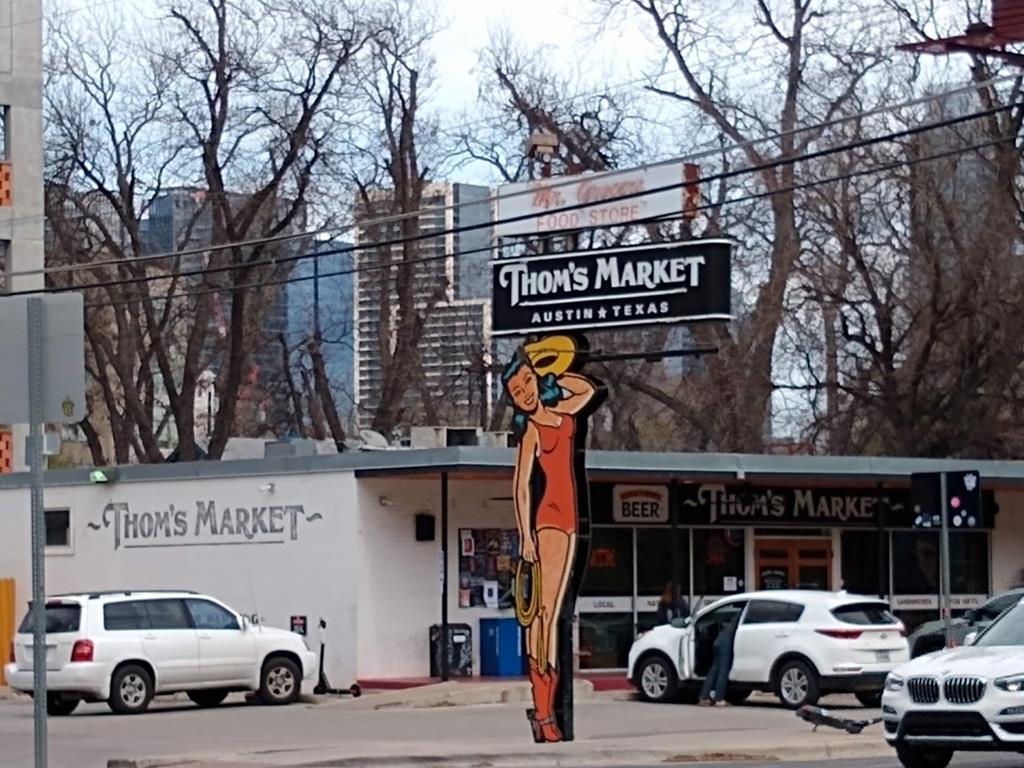
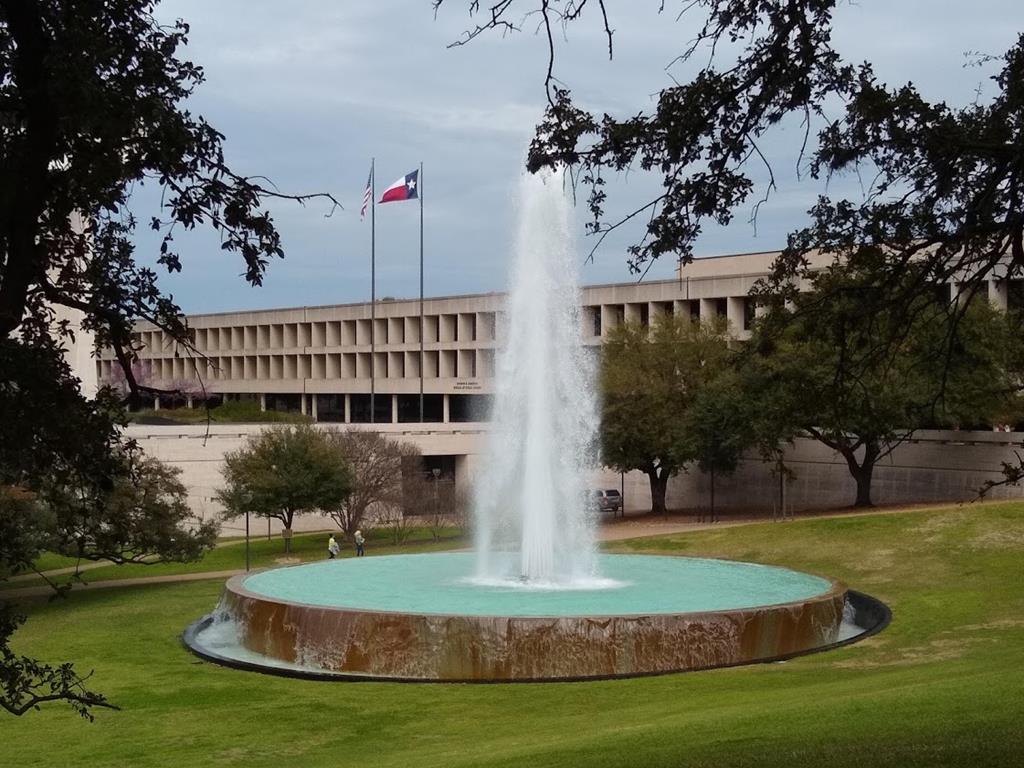
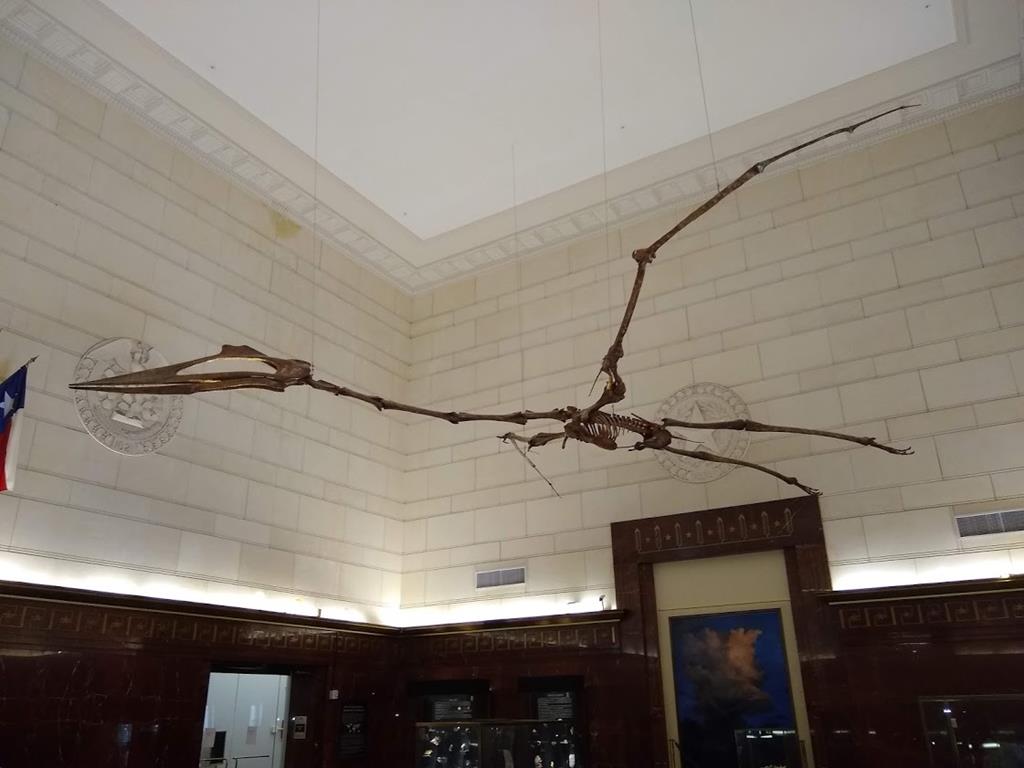

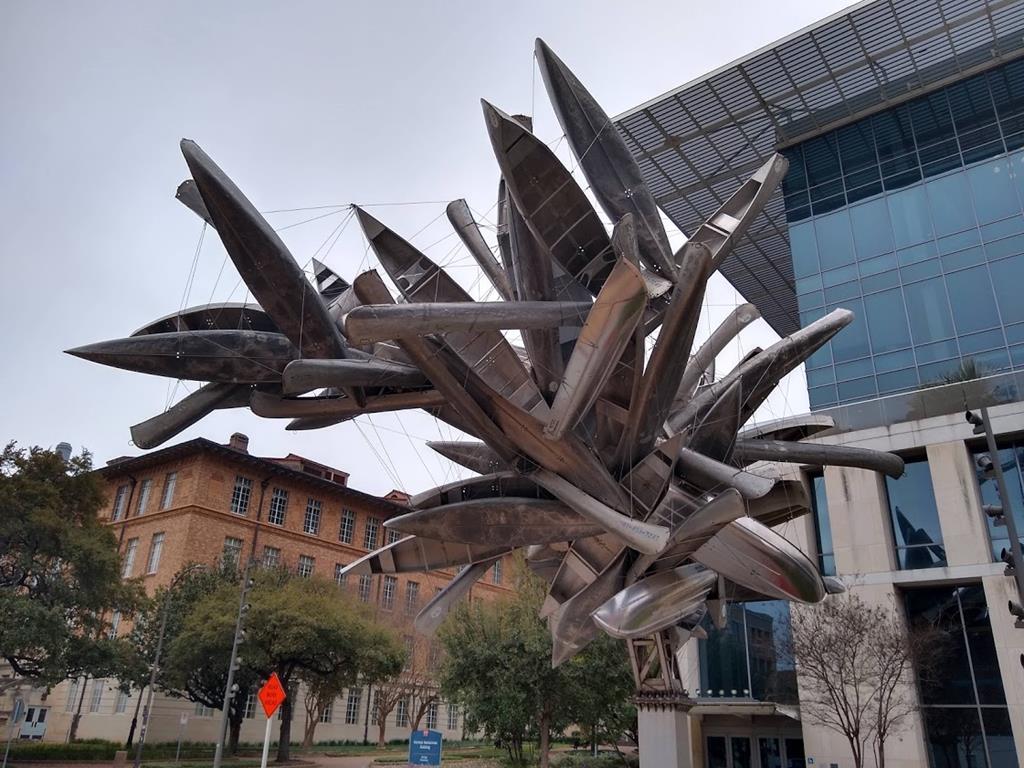
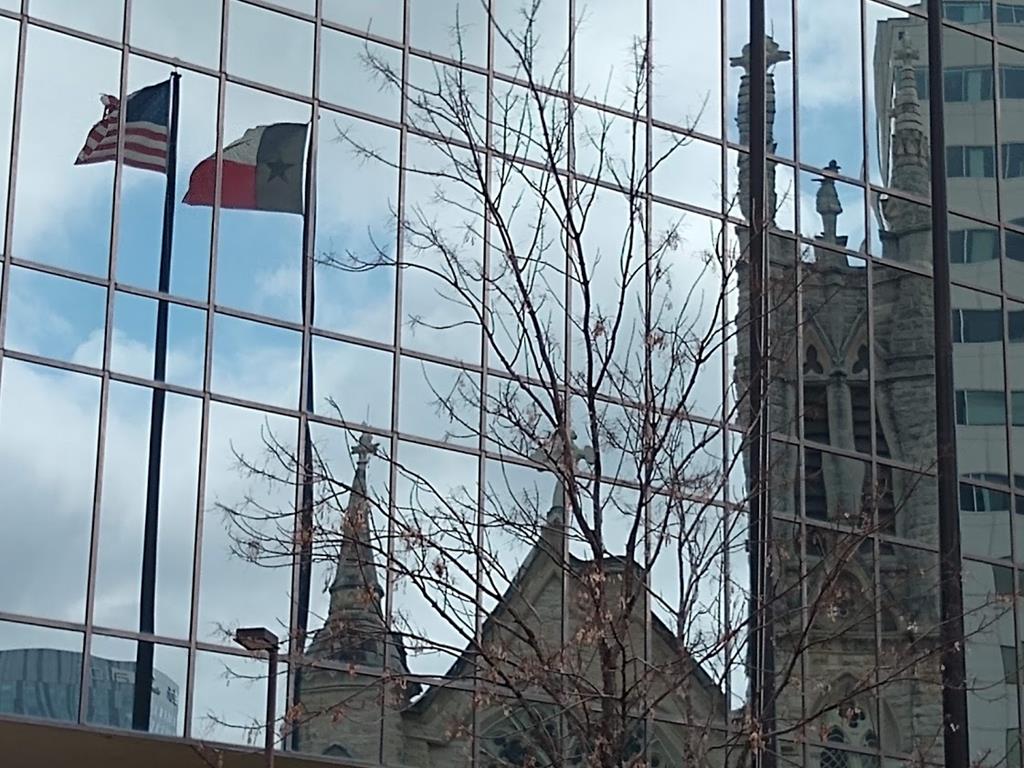
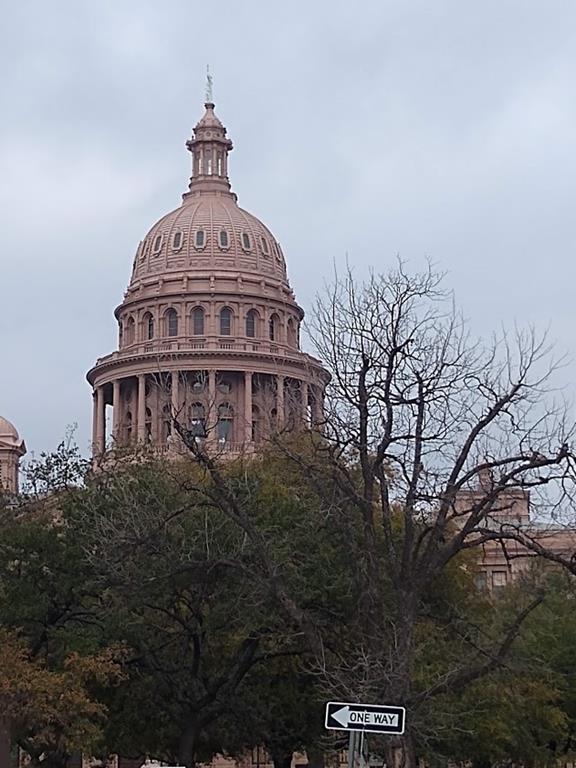

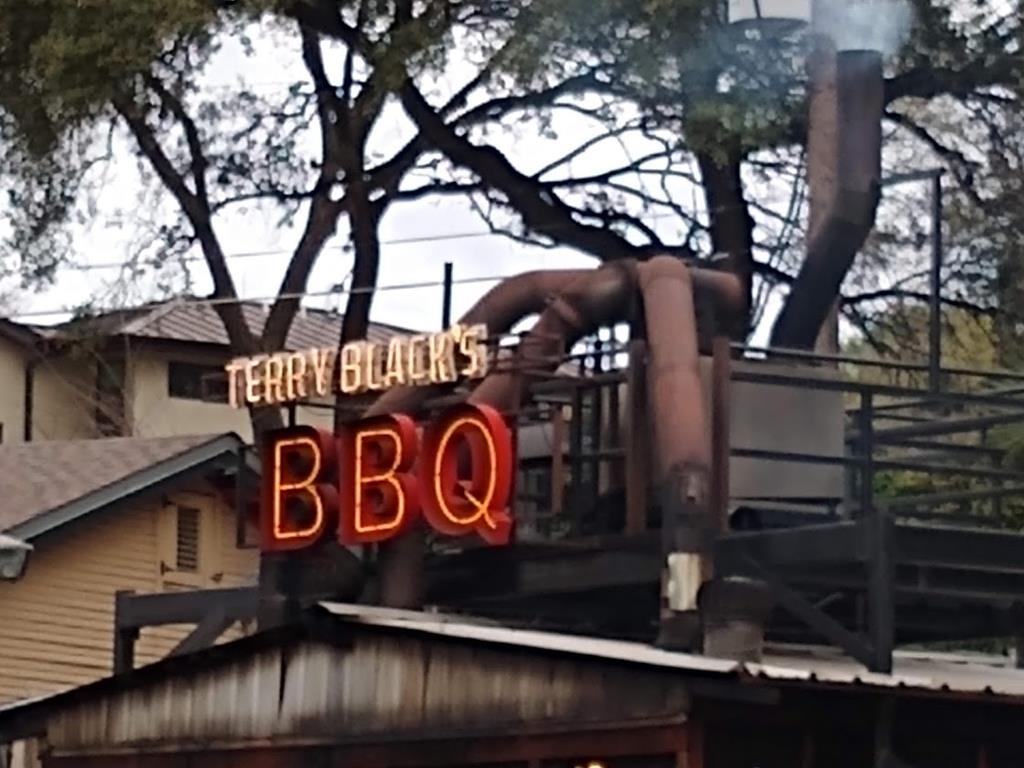 After a few hours of walking through the gardens and some time to write and read, I began my walk back along the river, watching several rowing crews practice on the water. Then I cut back over to Barton Springs Road, where I’m shocked at the line at Terry Black’s. I was told it was a 45-minute wait. If folks are waiting that long it must be good, I thought, and joined the line. It was. I had some of their pork and a brisket, both which were good. The banana pudding was passable.
After a few hours of walking through the gardens and some time to write and read, I began my walk back along the river, watching several rowing crews practice on the water. Then I cut back over to Barton Springs Road, where I’m shocked at the line at Terry Black’s. I was told it was a 45-minute wait. If folks are waiting that long it must be good, I thought, and joined the line. It was. I had some of their pork and a brisket, both which were good. The banana pudding was passable.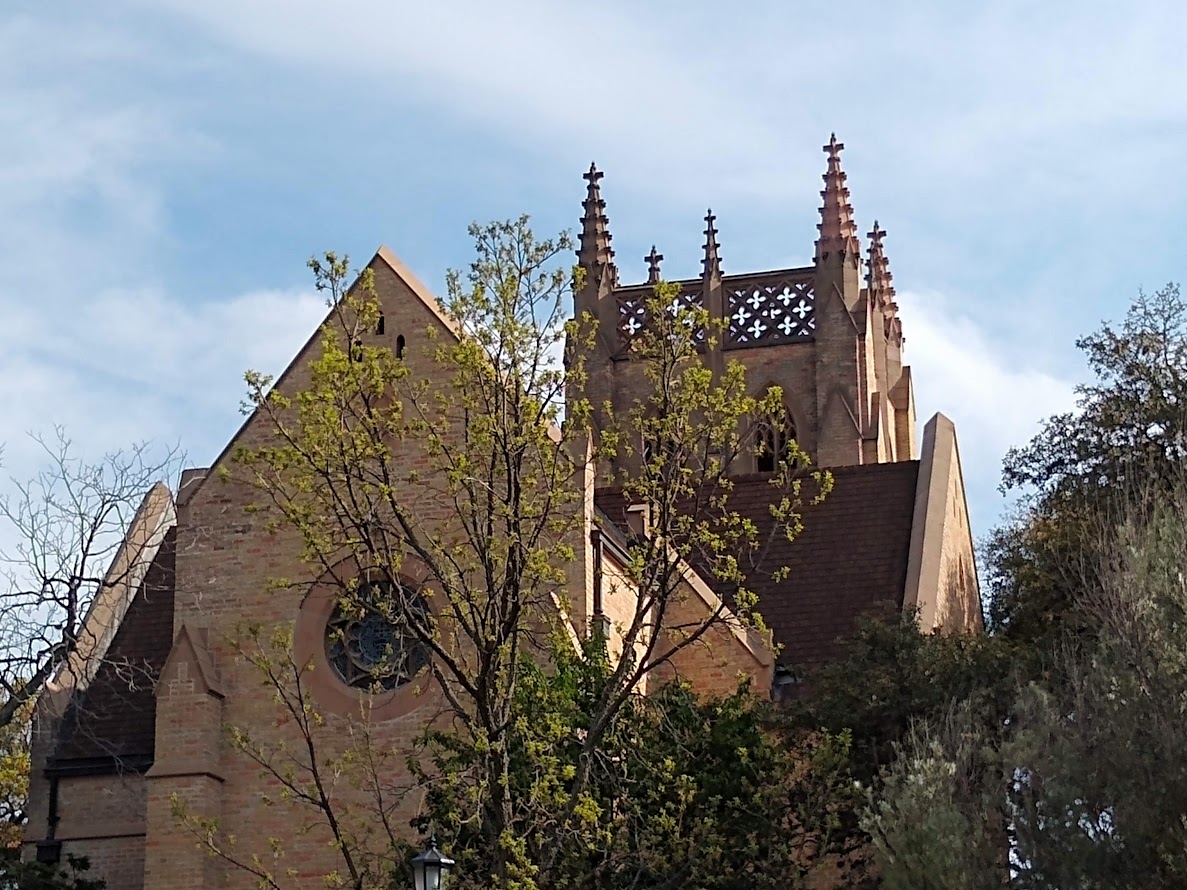
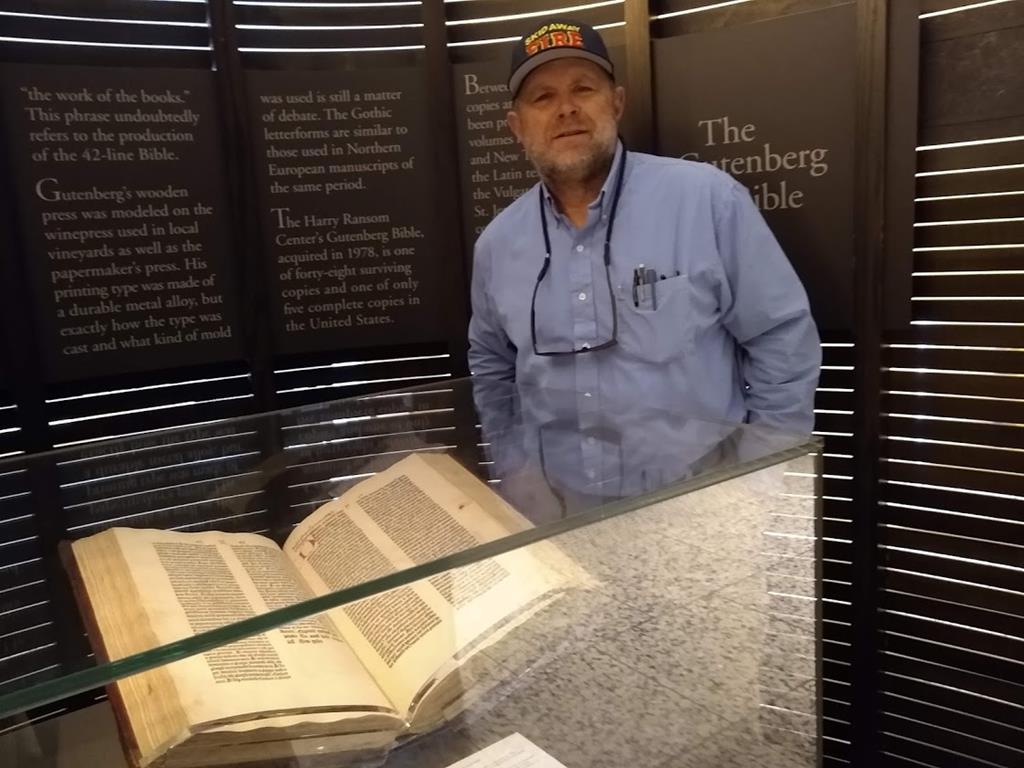
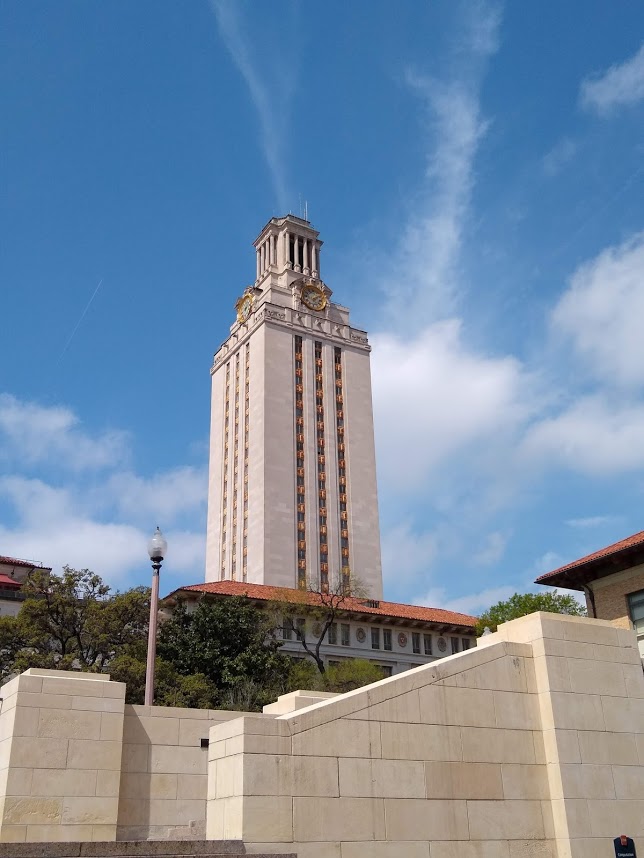
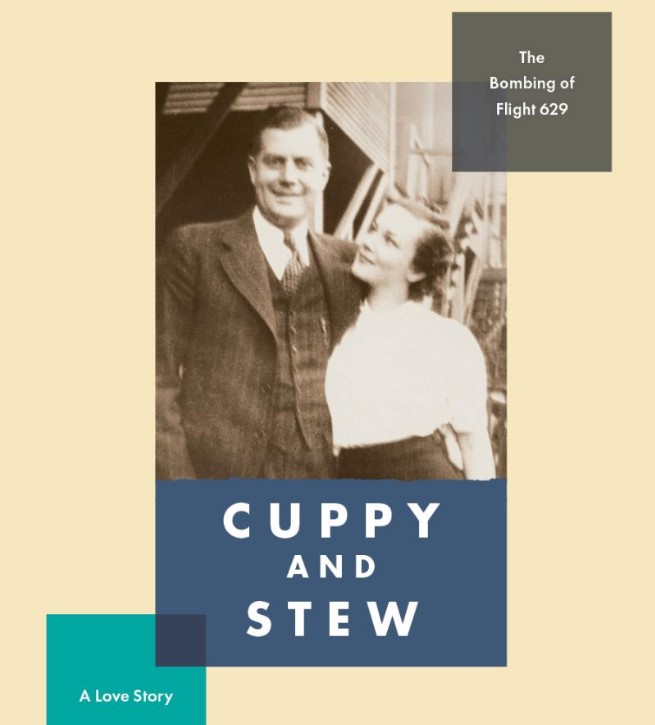 Eric Goodman, Cuppy and Stew: The Bombing of Flight 629, A Love Story (San Francisco: IF SF Publishing, 2020), 220 pages with a few photographs.
Eric Goodman, Cuppy and Stew: The Bombing of Flight 629, A Love Story (San Francisco: IF SF Publishing, 2020), 220 pages with a few photographs. High tide last night was at 9 PM. I went out around 8 PM, catching the last of the sunset and then watching the moonrise, paddling around Pigeon Island (approximately 5 miles). The tide was very high and I could easily go through the marsh. Here’s a poor quality photo taken with a smart phone from a kayak that was slightly rocking from the gentle waves. The photo doesn’t do the view justice. It was an incredible sight and the paddle was delightful
High tide last night was at 9 PM. I went out around 8 PM, catching the last of the sunset and then watching the moonrise, paddling around Pigeon Island (approximately 5 miles). The tide was very high and I could easily go through the marsh. Here’s a poor quality photo taken with a smart phone from a kayak that was slightly rocking from the gentle waves. The photo doesn’t do the view justice. It was an incredible sight and the paddle was delightful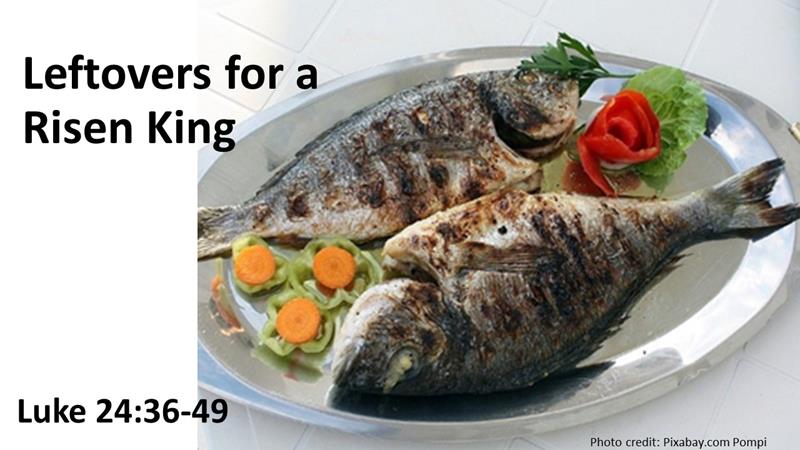 Jeff Garrison
Jeff Garrison

 One of the common characteristics of the post-resurrection appearances of Jesus is that no one is looking for him, and no one “finds him.” Instead, Jesus just shows up. The disciples are hearing from the women about Jesus not being in the tomb, reports of him being in Emmaus, and from Simon Peter. But they don’t send out a search party to find Jesus. They’re scared. They lock themselves into a room while discussing what they consider as rumors. And when Jesus mysteriously shows up, they freak out. “It’s a ghost!”
One of the common characteristics of the post-resurrection appearances of Jesus is that no one is looking for him, and no one “finds him.” Instead, Jesus just shows up. The disciples are hearing from the women about Jesus not being in the tomb, reports of him being in Emmaus, and from Simon Peter. But they don’t send out a search party to find Jesus. They’re scared. They lock themselves into a room while discussing what they consider as rumors. And when Jesus mysteriously shows up, they freak out. “It’s a ghost!” One of the lessons we should learn from the resurrection stories is that Jesus controls both his and our destinies. It’s not about us going out looking for God, it’s about God looking for us. There are no barriers that we can put up to avoid God. The disciples discovered this when Jesus pops in. This is good news for those of us sheltering and avoiding contact with others in order to stay healthy during this pandemic. While we might not be able to go to church on Sunday mornings, God can invade the privacy of our homes. We can’t keep God out. As Jesus shows us, God is in control. That’s good, because we can screw things up, so we’re a lot better off depending upon the God who surprises us, than depending on our own inability to bring us back into a relationship with the Almighty. This is what the Presbyterian doctrine of election or predestination is all about.
One of the lessons we should learn from the resurrection stories is that Jesus controls both his and our destinies. It’s not about us going out looking for God, it’s about God looking for us. There are no barriers that we can put up to avoid God. The disciples discovered this when Jesus pops in. This is good news for those of us sheltering and avoiding contact with others in order to stay healthy during this pandemic. While we might not be able to go to church on Sunday mornings, God can invade the privacy of our homes. We can’t keep God out. As Jesus shows us, God is in control. That’s good, because we can screw things up, so we’re a lot better off depending upon the God who surprises us, than depending on our own inability to bring us back into a relationship with the Almighty. This is what the Presbyterian doctrine of election or predestination is all about. But before the disciples can understand this, they must realize who this is that has invaded their meeting. In their mind, Jesus is dead. You don’t come back to this life once grasp the idea that he is risen. First, he asks for a bite to eat. It’s been a while since his last supper. It’s important that they see food going in his mouth (see food, seafood, get it?). Jesus then points to his flesh and bones. Luke wants to assure us that Jesus’ appearance to the disciples after his death isn’t just wishful thinking on their part.
But before the disciples can understand this, they must realize who this is that has invaded their meeting. In their mind, Jesus is dead. You don’t come back to this life once grasp the idea that he is risen. First, he asks for a bite to eat. It’s been a while since his last supper. It’s important that they see food going in his mouth (see food, seafood, get it?). Jesus then points to his flesh and bones. Luke wants to assure us that Jesus’ appearance to the disciples after his death isn’t just wishful thinking on their part.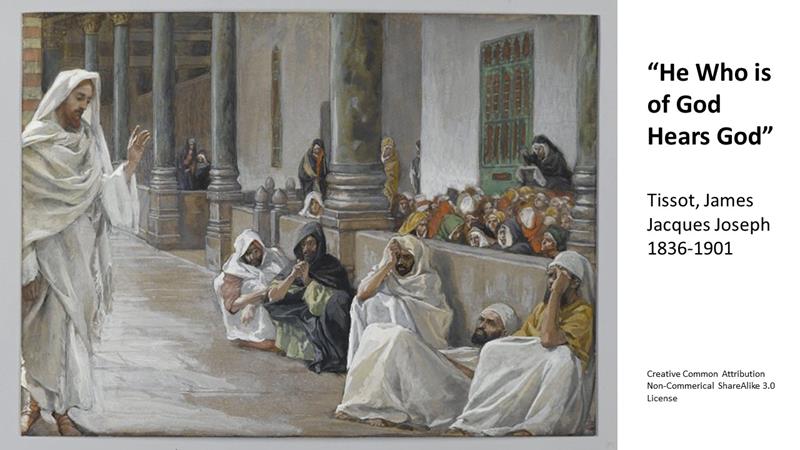 The second thing Jesus does, which is like what he did with those in Emmaus, is to help the disciples understand the scriptures. Jesus wants them to grasp the idea that his suffering, death, and resurrection has been God’s plan.
The second thing Jesus does, which is like what he did with those in Emmaus, is to help the disciples understand the scriptures. Jesus wants them to grasp the idea that his suffering, death, and resurrection has been God’s plan. Of course, because this is God’s doing, not the disciples’, they will need to be given the strength and ability to carry this mission out. Jesus, in his commission to the disciples in Luke’s gospel, is looking forward to the: coming of the Holy Spirit, to Pentecost, after which the disciples will take Jesus’ message to the end of the world.
Of course, because this is God’s doing, not the disciples’, they will need to be given the strength and ability to carry this mission out. Jesus, in his commission to the disciples in Luke’s gospel, is looking forward to the: coming of the Holy Spirit, to Pentecost, after which the disciples will take Jesus’ message to the end of the world. Jesus shows up and calls us because, sooner or later, we are no longer going to be hiding in our home. Life will open back up and when that happens, we need to be ready (just as the disciples were ready on Pentecost) to go into the world and make a difference. Think of this time we’re in as a Sabbath. Like the disciples, we rest today. In a short while, there will be plenty for us to do. As followers of Jesus, we’re to change the world, to make it a kinder more generous and gracious, home. May we catch that vision and live into it. Amen.
Jesus shows up and calls us because, sooner or later, we are no longer going to be hiding in our home. Life will open back up and when that happens, we need to be ready (just as the disciples were ready on Pentecost) to go into the world and make a difference. Think of this time we’re in as a Sabbath. Like the disciples, we rest today. In a short while, there will be plenty for us to do. As followers of Jesus, we’re to change the world, to make it a kinder more generous and gracious, home. May we catch that vision and live into it. Amen.
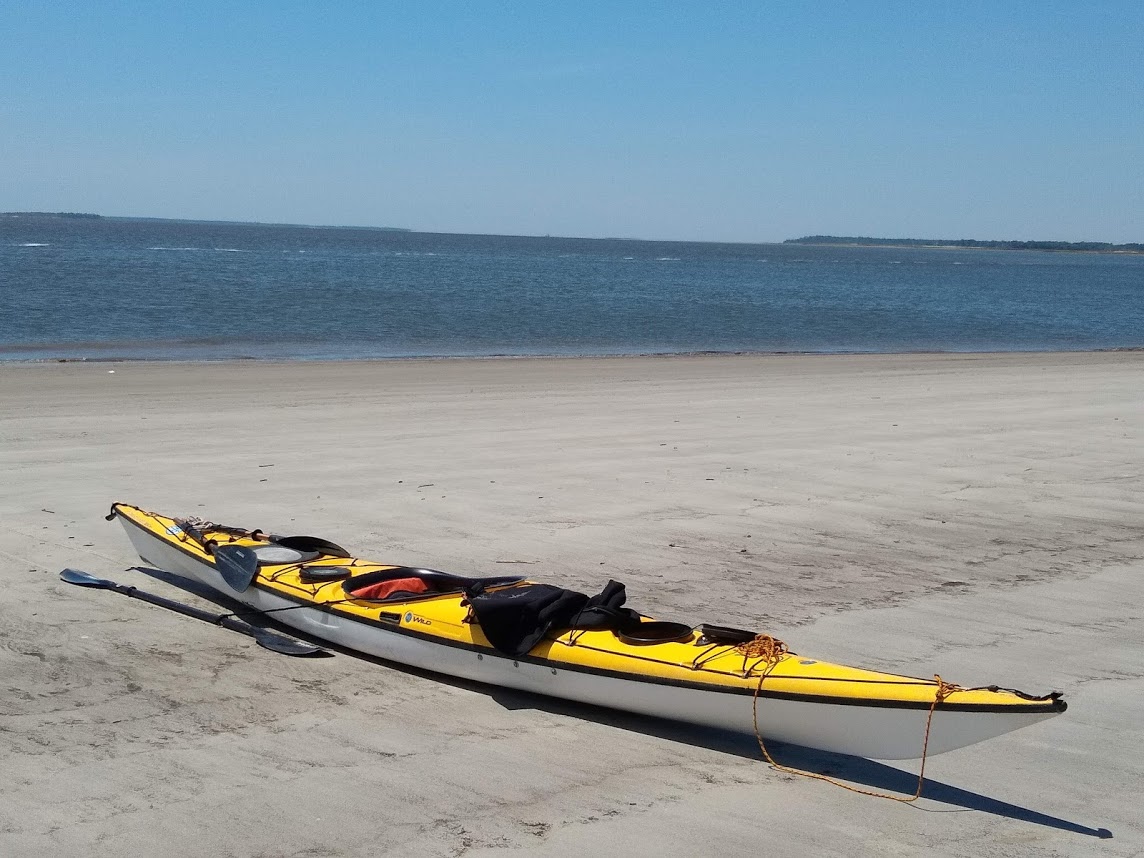

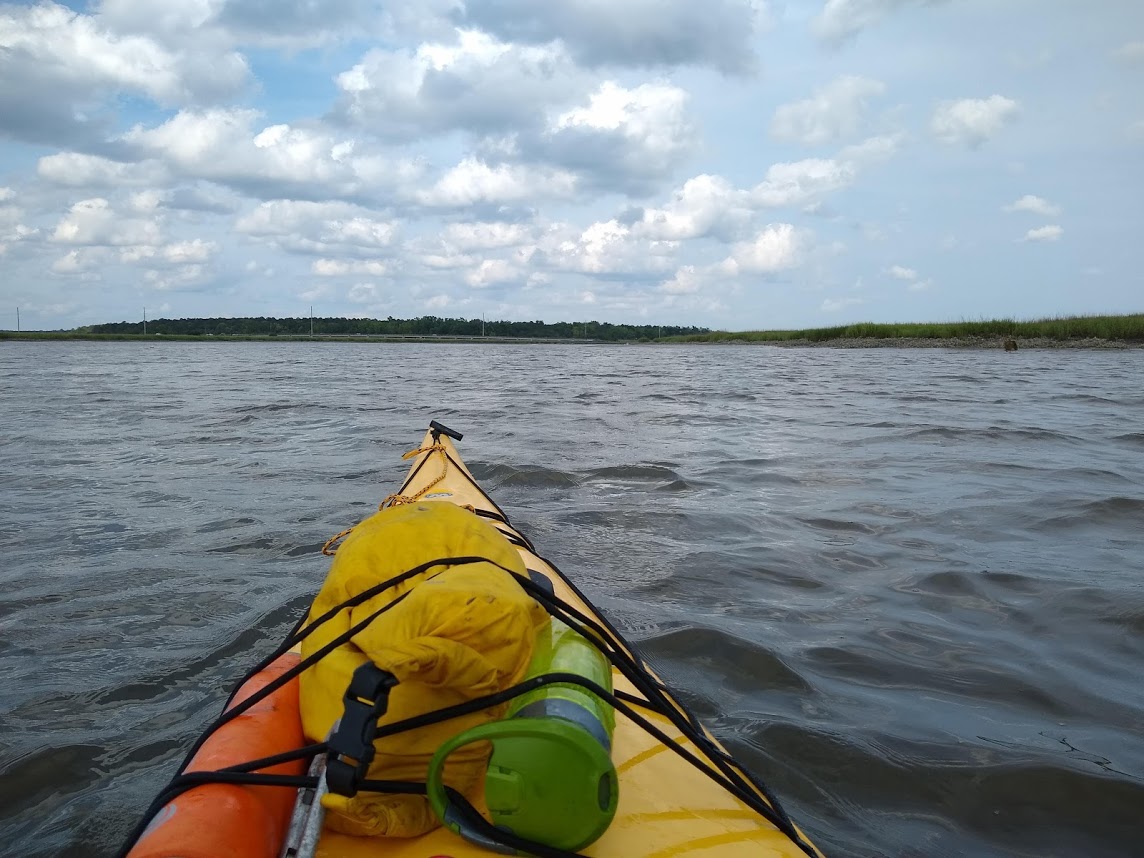

 I have a lot of time to think out here, watching the sheep. I see a lot of people coming and going. Jerusalem, the Holy City, is just over the rise, a few miles away. These three were heading away from the city and engaged in a great debate. Even with my back turned, I could hear them a mile away. And as they were talking, the third guy, the one in a white robe, catches up with them. He joins their conversation. They seem rather surprised that he didn’t know what they were talking about. There’s this man, supposedly a king, who’d been crucified. But then he starts asking questions and I can tell they are intrigued. Here, a guy who didn’t seem to know the news, yet knows the scriptures.
I have a lot of time to think out here, watching the sheep. I see a lot of people coming and going. Jerusalem, the Holy City, is just over the rise, a few miles away. These three were heading away from the city and engaged in a great debate. Even with my back turned, I could hear them a mile away. And as they were talking, the third guy, the one in a white robe, catches up with them. He joins their conversation. They seem rather surprised that he didn’t know what they were talking about. There’s this man, supposedly a king, who’d been crucified. But then he starts asking questions and I can tell they are intrigued. Here, a guy who didn’t seem to know the news, yet knows the scriptures. 

 On this occasion, they are walking and discussing the events of the past few days when they are joined by a stranger. This makes sense to me, as I have walked a lot in my life. I recall numerous occasions along the Appalachian Trail where I was talking to someone and a third person comes up behind us and, overhearing what we were talking about, puts his two cents worth.
On this occasion, they are walking and discussing the events of the past few days when they are joined by a stranger. This makes sense to me, as I have walked a lot in my life. I recall numerous occasions along the Appalachian Trail where I was talking to someone and a third person comes up behind us and, overhearing what we were talking about, puts his two cents worth. Something else happens. Jesus, at the table, goes from being the guest to the host.
Something else happens. Jesus, at the table, goes from being the guest to the host.
 In some ways, our encounters with Christ are probably more like these two disciples walking to Emmaus. There are very few Damascus Road experiences, like that of Paul. It ranks up there with Moses’ burning unburned bush. Most of us experience Christ, like these two, when we realize something someone said caused our hearts to burn, or when someone opens Scripture and we learned the eternal truths of God’s Word. And when something like that happens, we must tell someone. It’s a Truth we can’t keep to ourselves. This is how our faith spreads. We encounter Christ through his word or through someone who speaks to us about Christ and then Christ becomes real to us.
In some ways, our encounters with Christ are probably more like these two disciples walking to Emmaus. There are very few Damascus Road experiences, like that of Paul. It ranks up there with Moses’ burning unburned bush. Most of us experience Christ, like these two, when we realize something someone said caused our hearts to burn, or when someone opens Scripture and we learned the eternal truths of God’s Word. And when something like that happens, we must tell someone. It’s a Truth we can’t keep to ourselves. This is how our faith spreads. We encounter Christ through his word or through someone who speaks to us about Christ and then Christ becomes real to us.
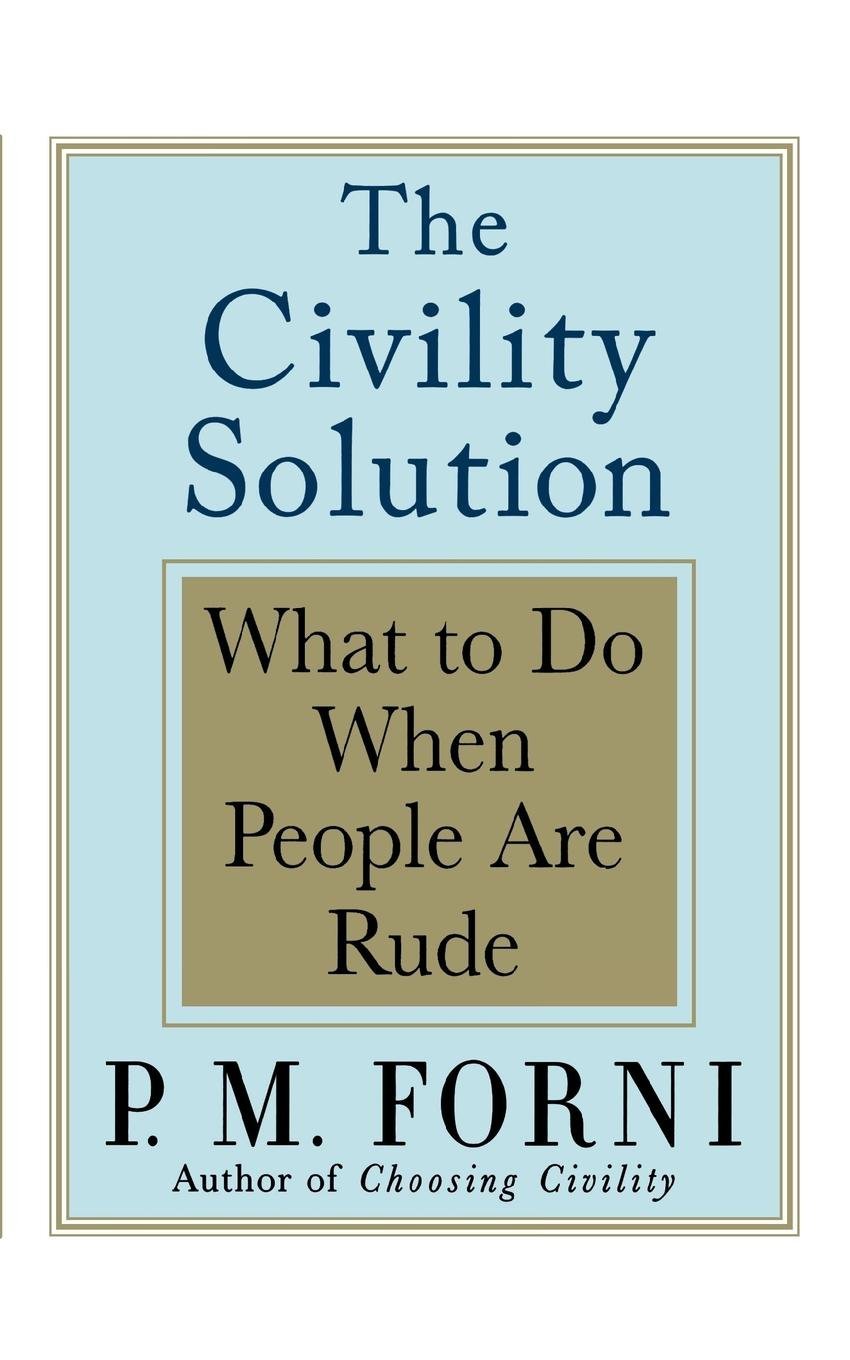
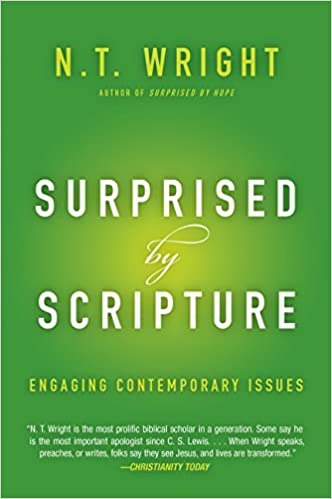 N. T. Wright, Surprised by Scripture: Engaging Contemporary Issues (New York: HarperOne, 2014), 223 pages including a scripture index.
N. T. Wright, Surprised by Scripture: Engaging Contemporary Issues (New York: HarperOne, 2014), 223 pages including a scripture index.